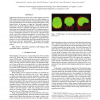Free Online Productivity Tools
i2Speak
i2Symbol
i2OCR
iTex2Img
iWeb2Print
iWeb2Shot
i2Type
iPdf2Split
iPdf2Merge
i2Bopomofo
i2Arabic
i2Style
i2Image
i2PDF
iLatex2Rtf
Sci2ools
149
click to vote
ISBI
2011
IEEE
2011
IEEE
Skull-stripping with deformable organisms
Segmenting brain from non-brain tissue within magnetic resonance (MR) images of the human head, also known as skull-stripping, is a critical processing step in the analysis of neuroimaging data. Though many algorithms have been developed to address this problem, challenges remain. In this paper, we apply the “deformable organism” framework to the skull-stripping problem. Within this framework, deformable models are equipped with higher-level control mechanisms based on the principles of artificial life, including sensing, reactive behavior, knowledge representation, and proactive planning. Our new deformable organisms are governed by a high-level plan aimed at the fully-automated segmentation of various parts of the head in MR imagery, and they are able to cooperate in computing a robust and accurate segmentation. We applied our segmentation approach to a test set of human MRI data using manual delineations of the data as a reference “gold standard.” We compare these results ...
Related Content
| Added | 21 Aug 2011 |
| Updated | 21 Aug 2011 |
| Type | Journal |
| Year | 2011 |
| Where | ISBI |
| Authors | Gautam Prasad, Anand A. Joshi, Paul M. Thompson, Arthur W. Toga, David W. Shattuck, Demetri Terzopoulos |
Comments (0)

